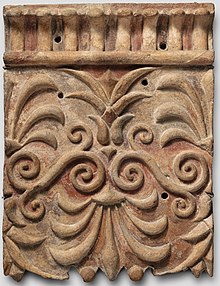

The palmette is a motif in decorative art which, in its most characteristic expression, resembles the fan-shaped leaves of a palm tree. It has a far-reaching history, originating in ancient Egypt with a subsequent development through the art of most of Eurasia, often in forms that bear relatively little resemblance to the original. In ancient Greek and Roman uses it is also known as the anthemion (from the Greek ανθέμιον, a flower). It is found in most artistic media, but especially as an architectural ornament, whether carved or painted, and painted on ceramics. It is very often a component of the design of a frieze or border. The complex evolution of the palmette was first traced by Alois Riegl in his Stilfragen of 1893. The half-palmette, bisected vertically, is also a very common motif, found in many mutated and vestigial forms, and especially important in the development of plant-based scroll ornament.